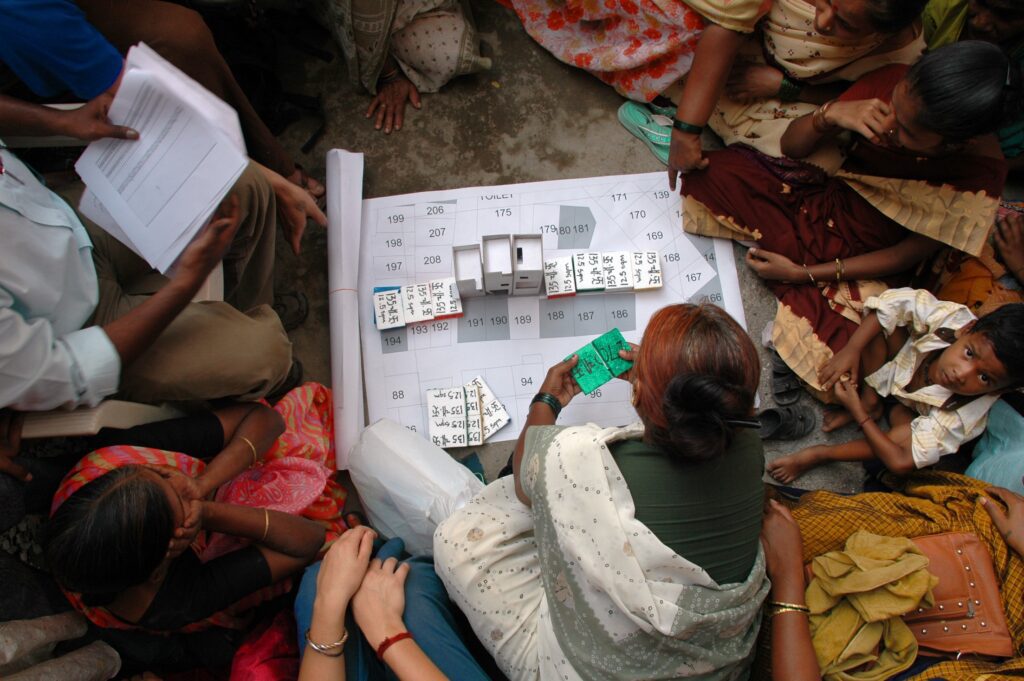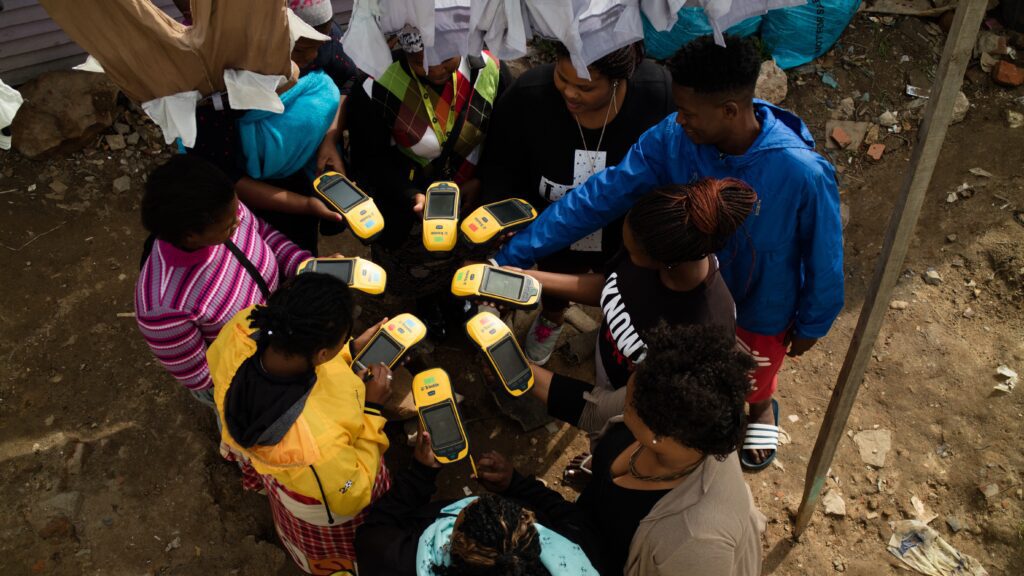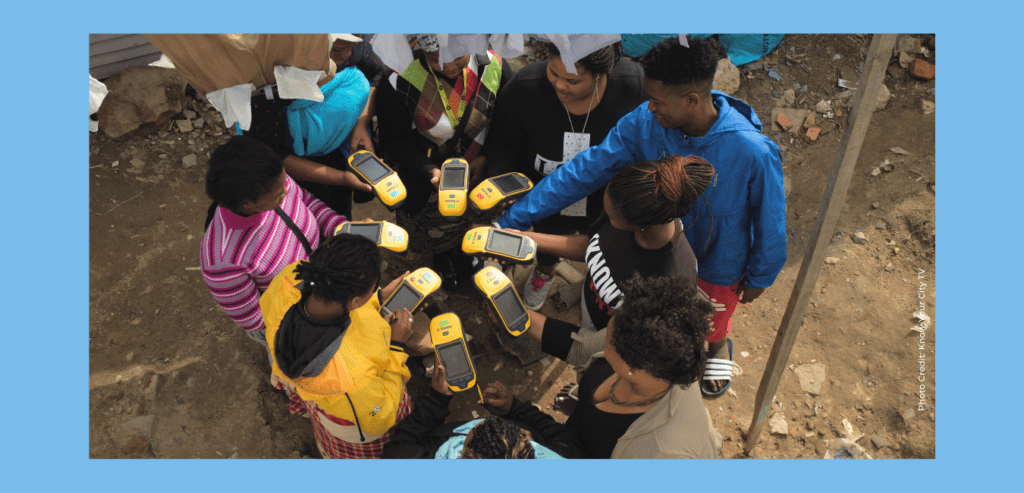Author: Dawn Pauls
Understanding the demographics and characteristics of an informal settlement is critical. Gaining accurate information is important to support children in informal settlements, as when we understand the problems then it’s easier to find solutions. A key issue is that residents in informal settlements are often missing from census data and other official or formal surveys.
This presents many problems. A scarcity of accurate and relevant knowledge can slow efforts to improve the lives of urban children living in informal settlements and contribute to unequal resource distribution such as the availability of schools and water and sanitation infrastructure. Problems confronted by children living in informal settlements are not fully documented. Therefore, understanding key statistics such as how many children live in an area, what resources they or their families have, and the challenges they face is fundamental to improving their lives.
Simultaneously, it is recognised that there are “opportunities to capitalise on efficiencies of scale and proximity, on urban concentrations of resources, and on the proven creativity and resourcefulness of people in poverty, especially when they are organised and when they have the space to explore what works for them”.
One of the ways to address the scarcity of reliable data is through the co-production of knowledge, a recognised strategy employed in urban informal settlements. Co-production generally means to engage in “supporting and building on the self-help strategies of people in poverty”. Co-producing knowledge involves a collaborative effort between two or more actors such as local governments, academics, NGOs, citizen groups or others to survey, map, assess and identify both resources and challenges within a community. One example is a local community group mapping out their neighbourhood including where the toilets and water sources are located, and which are accessible to children of different ages or sizes. They could then use this data to identify ‘gaps’ in the access to water, sanitation and hygiene (WASH) for small children and make a plan to address these gaps by ensuring that children of all ages have access to WASH infrastructure.
“Community-driven surveys conducted in informal settlements provide the richest spatially disaggregated data” (WASH: Improving Provision for Urban Children, Cities4Children).

Photo Credit: Know Your City TV, project of Slum Dwellers International
Why do we need co-production?
Local governments often don’t have the capacity or resources to address the challenges of urban poverty, even though they have a crucial role in assisting urban poor residents. Other entities such as NGOs, researchers, the private sector and international agencies often play an important role in supporting the relationship between urban citizens and local governments. Co-production processes in partnership with local governments and urban poor citizen groups, which are also supported by third party actors, are critical to improving local governance. These groups hold local authorities responsible to meet the needs of the youngest urban residents such as safer streets and providing space to play. Co-production of knowledge which includes honouring local knowledge is key to taking the first steps down this path. It deepens citizen engagement, supports inclusion, recognises the value of multi-agency collaboration and often leads to partnerships that improve living standards and conditions.
Knowledge co-production processes must include children and youth as meaningful participants. One good example of this was in Mozambique, as part of a collaborative data collection effort between local community children, active local associations, the Municipality of Maputo, UNICEF, and UN-Habitat. As part of this effort, children were provided digital technology to document their daily movements throughout the community. The children gathered in-depth data that differed from how adults experience their neighbourhood.
Addressing Tensions in Co-producing Knowledge
However, tensions may exist in the co-production of knowledge. The following lessons that have been learned over time can inform future activities between local mobilisers and governments (adapted from Mitlin et al 2019):
- Tensions in co-producing knowledge are rooted in unequal power dynamics. Inequality in status or power can cause harm to knowledge production. It is important to engage in dialogue with community members about how status and power differences can amplify or diminish others’ perspectives. Identifying and valuing perspectives of the most disadvantaged contributes to more robust and reliable information. Actors who hold the power to make decisions about resource distribution should acknowledge and address the tensions that this power may create in partnerships with community mobiliser groups.
- Seeking an understanding of each actor’s reasons for producing the knowledge is important. Community movements, for example, may want the knowledge to build their activist movement, to gain political influence, and to redistribute resources. Other actors may want to use the knowledge to convince local government authorities to adopt new policies. Understanding the theories of change, reaching consensus, and identifying shared goals is key to a well-designed co-producing partnership.
- Organisations and urban professionals seeking to co-produce knowledge should make ample time and space to learn from community mobilisers. Local community groups hold integral, relevant insights which should inform the co-producing process.
- It is important to allow the local community to own the data collection and knowledge generation process. Outsiders should wait to be invited to help. When outsiders “take over” the knowledge production process, this strips the learning and capacity building potential from local community members. SDI, for example, has identified the importance for community ownership of data.
- Establishing well-designed partnerships between various actors engaged in improving the lives of poor urban children takes time.
“When they (poor urban communities) share the data (that they own) with government, they are able to create new relationships — and even institutions — that make the poor integral role players in the decisions that affect their lives”.
Co-Producing Knowledge in the Vusi Ntsuntsha Project (South Africa)
The Vusi Ntsuntsha housing development project, part of SDIs Know Your City Campaign in the Western Cape Province of South Africa, provides an excellent example of knowledge co-production. A key component of the project is a collaboration between the local community, the provincial government and local support NGOs to enumerate and profile residents of settlements. In addition, the youth of the Know Your City TV (KYCTV) program, which empowers youth through the use of media, partnered with the Vusi Ntsuntsha project by recording data and media during workshops, meetings and data collection processes.
The community driven process of data gathering included demographic data on residents, how many residents live in each household and the resources they have or lack. The data ensured that the community became ‘visible’ in a tangible way and provided a practical way for the Western Cape Provincial Government to screen and prioritise households that would receive housing grants. By November 2019, over 400 beneficiaries had been enumerated and verified as formal members of the housing project. This successful process of co-producing knowledge has enabled the community to create useful data, gain crucial knowledge, understanding and ownership of the enumeration process. One of the ‘mamas’ of the project, Thandeka Gloria Thunyiswa, said she became involved to get a larger house so that her grandchildren can have somewhere to be in her home, and for her children, one of whom is disabled, to have a place to stay when she dies.

Cape Town, South Africa and shows Federation members who work to gather GIS data using Trimble Geospatial devices. Photo Credit: Know Your City TV, project of Slum Dwellers International
Conclusion
Over the past six years, as iNGOs and other child-focused organizations engage and define their roles and processes working with marginalized urban communities, many have adopted urban-specific policies and procedures. Each of these efforts promote engaging with community organisations to identify and define the resources they have and the challenges they face. Co-producing knowledge and gaining a deeper understanding of the tensions that the process holds, is a promising avenue for scalable improvements in the lives of marginalized urban children.
About the Author
Dawn Pauls is a MEL consultant, urban child advocate, program evaluator, researcher, project manager, teacher of young children, and mother of four. She is interested in complex adaptive systems using a collaborative research and evaluation approach to effectuate tangible improvements in urban children’s lives.
This work is licensed under a Creative Commons Attribution-NonCommercial-NoDerivatives 4.0 International License. When re-sharing this content please ensure accreditation by adding the following sentence: ‘This blog was first published by the Global Alliance – Cities4Children

